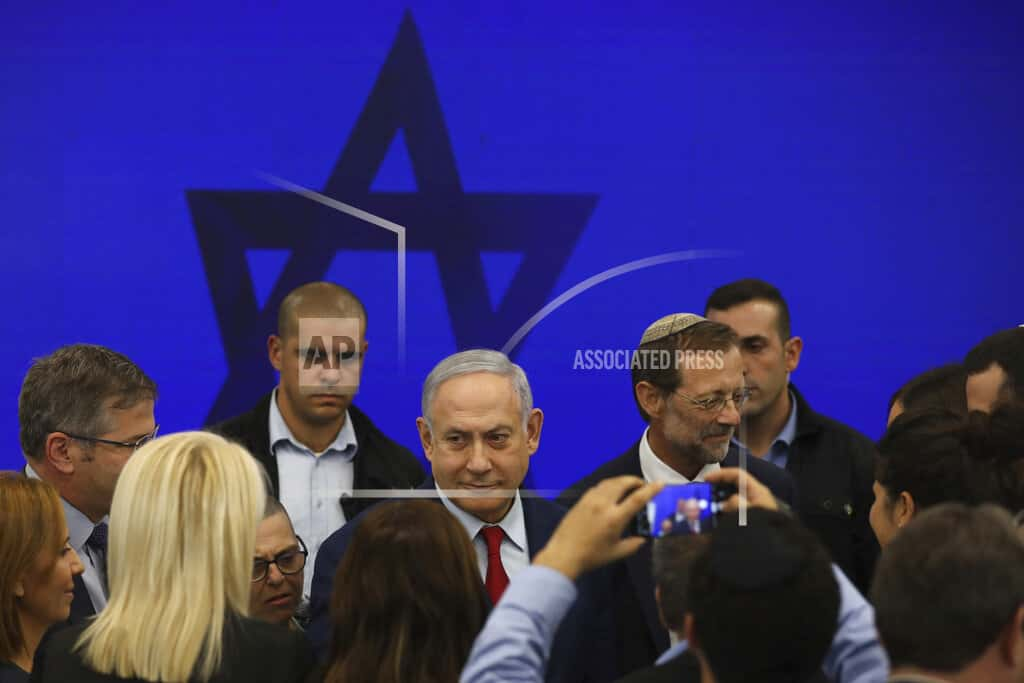
JERUSALEM (AP) — Israel’s prime minister on Tuesday vowed to annex the strategic heartland of the West Bank if he wins national elections next week, offering a vision that would likely end any remaining hopes for establishing a Palestinian state.
Prime Minister Benjamin Netanyahu said he would annex the Jordan Valley, an area seen as the breadbasket of any Palestinian state, shortly after forming a new government and move later to annex remaining Jewish settlements. Such action would gobble up most of the West Bank territory sought by the Palestinians, leaving them with little more than isolated enclaves.
“Today I am announcing my intention to apply, with the formation of the next government, Israeli sovereignty on the Jordan Valley and northern Dead Sea,” he said. Unveiling a map, he called the strategic area “Israel’s eastern border.”
Netanyahu’s announcement was the latest in a series of frenetic moves he has made in recent days aimed at rallying his hard-line voters ahead of the Sept. 17 election, and his plan would hinge on a number of factors, most critically whether President Donald Trump would support him. Nonetheless, it was the most detailed vision for the region that Netanyahu has presented during more than a decade in power.
Appearing some 90 minutes late at a hastily called news conference, Netanyahu said that it was important to act as Trump prepares to unveil his Mideast peace plan after Israeli elections.
“This is a historic opportunity, a one-time opportunity, to extend Israeli sovereignty on our settlements in Judea and Samaria, and also on other important regions for our security, for our heritage, and for our future,” he said, using the biblical terms for the West Bank.
He gave no indication on whether he had discussed his plans with Trump, but said he would wait for Trump’s peace plan and coordinate all steps with the president, whose team of Mideast advisers is dominated by supporters of the settlements.
U.S. officials said Netanyahu had told them about his proposal ahead of time and had not raised any objections because they do not think it will affect prospects for an eventual agreement. The officials spoke on condition of anonymity because they were not authorized to talk to the media.
The Palestinians seek the West Bank, east Jerusalem and the Gaza Strip — areas captured by Israel in the 1967 Mideast war — for a future independent state. A mass annexation of parts of the West Bank would likely end any remaining hopes for establishing a viable Palestinian state. Israel already has annexed east Jerusalem in a move that is not internationally recognized.
Palestinian official Saeb Erekat said Netanyahu’s annexation plan is “manifestly illegal.”
“Israel’s unprecedented culture of impunity, enabled by international inaction, is the only explanation for Mr. Netanyahu’s audacity in using annexation as an election ploy,” he said, calling on the international community to block the Israeli leader’s plan.
The international community, along with the Palestinians, overwhelmingly considers Israeli settlements in the West Bank and east Jerusalem illegal. Nearly 700,000 settlers live in the two areas, in addition to over 2.5 million Palestinians.
Netanyahu was not clear about the fate of the Palestinians. But for the first time, he unveiled a map showing his plan for annexing the Jordan Valley.
The plan would turn Palestinian population centers into isolated enclaves that he said he would seek to link to neighboring Jordan. Unlike Israeli settlers, West Bank Palestinians are not Israeli citizens and do not have the right to vote.
Opposition politicians alike criticized Netanyahu for proposing West Bank annexation as part of his campaign. On Twitter, Ayman Odeh, leader of the Joint List of Arab parties, called Netanyahu’s statement “not just election spin” but “a vision of apartheid.” Ehud Barak, a former prime minister who is campaigning to oust Netanyahu, said the prime minister “has no public or moral mandate to determine things so fateful to the state of Israel.”
Locked in a tight race, Netanyahu has resorted to a series of stunts in recent days aimed at drawing attention to his campaign and, critics say, diverting attention from a looming corruption case.
Alleging fraud in Arab voting areas, Netanyahu has been pushing an unsuccessful campaign to place cameras in polling stations on election day. He also claimed to have located a previously unknown Iranian nuclear-weapons facility, and later this week, flies to Russia for a lightning meeting with President Vladimir Putin.



